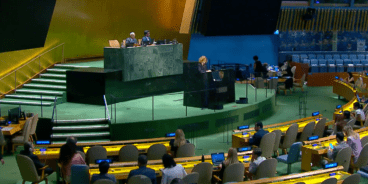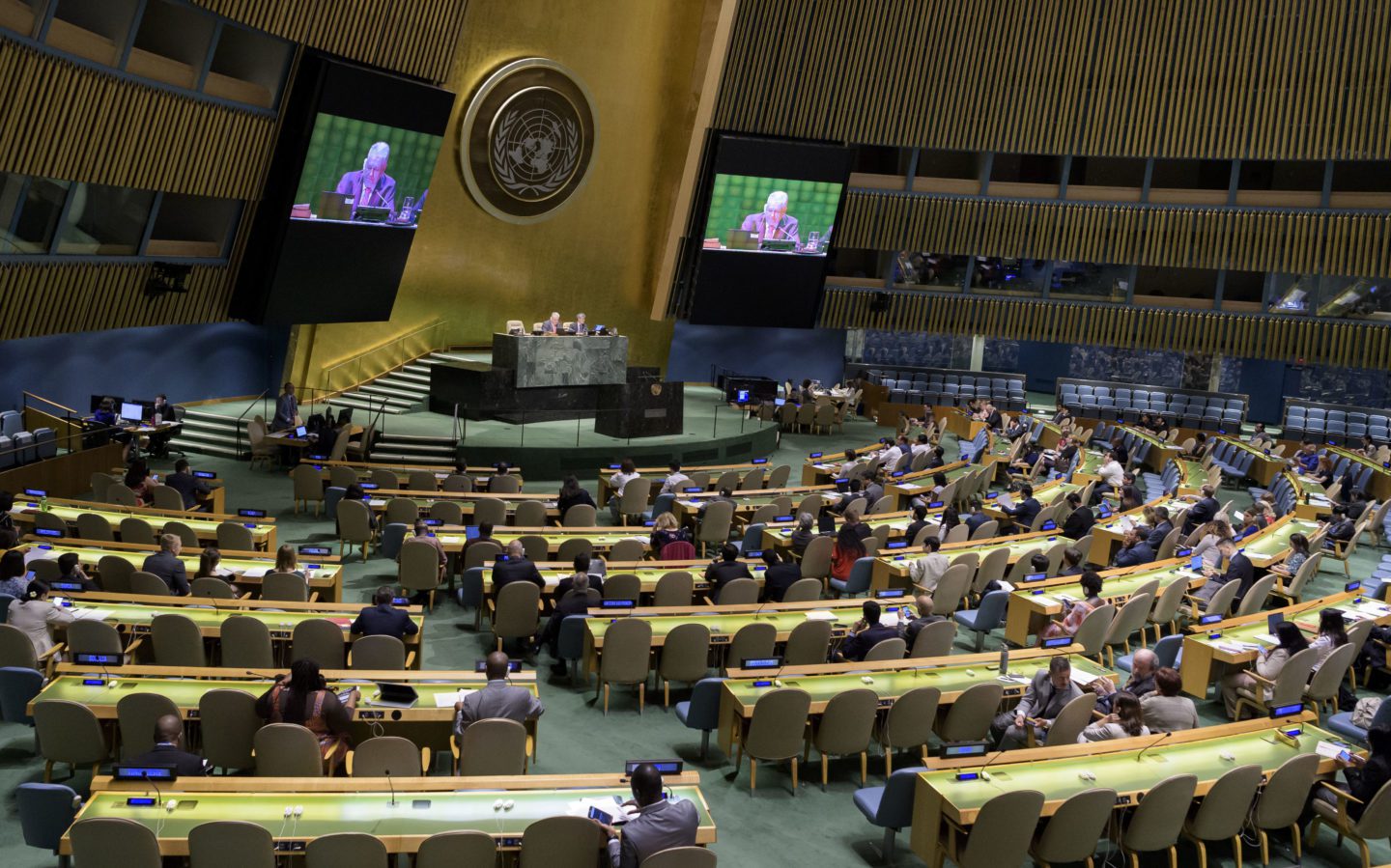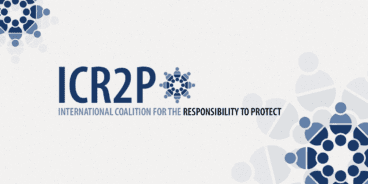
Statement by Dr. Simon Adams on behalf of the Global Centre for the Responsibility to Protect at the 2015 UN General Assembly Informal Interactive Dialogue on the Responsibility to Protect
Statement delivered by Dr. Simon Adams, Executive Director of the Global Centre for the Responsibility to Protect, on 8 September 2015 at the UN General Assembly in New York.
Mr. President,
I would like to thank you for organizing this informal interactive dialogue on the report of the UN Secretary-General on the Responsibility to Protect. I especially thank the Secretary-General and the Deputy-Secretary-General for their enduring commitment to this important principle. I also acknowledge the crucial work of Special Adviser Adama Dieng and Special Adviser Dr. Jennifer Welsh and the UN Office on Genocide Prevention and the Responsibility to Protect.
Mr. President, the diverse array of Member States that have spoken at this dialogue have emphasized the undeniable progress that has been made since the adoption of the Responsibility to Protect at the 2005 World Summit. I am particularly encouraged by the statement by the 49-member Group of Friends of the Responsibility to Protect, and thank the Netherlands and Rwanda for their committed leadership of this large cross-regional grouping.
There is now virtually universal agreement that there is a Responsibility to Protect populations from genocide, war crimes, ethnic cleansing and crimes against humanity. The enduring challenge is how to do so in a consistent and comprehensive manner, avoiding doing more harm than good, ensuring that wherever possible preventive measures and diplomacy predominate over military means. But when prevention fails, the international community must not abandon those facing the machete or the mass grave. The twentieth anniversary of the July 1995 Srebrenica genocide should remind us all of the price of inaction.
Since 2005 the UN Security Council has referenced the Responsibility to Protect in over 35 of its binding resolutions. The Human Rights Council has also invoked R2P in its resolutions and in the findings of its important commissions of inquiry.
The progress has been much more than just fine words and resolutions. Right now there are peacekeepers in the Democratic Republic of the Congo, Central African Republic, South Sudan and elsewhere who are risking their lives protecting civilians from mass atrocity crimes.
In terms of strengthening prevention, which is at the heart of R2P, on 27 August Rwanda appointed a senior-level official as an R2P Focal Point, becoming the 50th member of the Global Network of R2P Points. This marks a significant moment: more than a quarter of the UN membership now have a national R2P Focal Point, making this the largest inter-governmental network dedicated to preventing mass atrocities. Other recent members include Angola, Qatar, Jordan and Guinea, as well as the European Union, who became the first regional organization to formally appoint an R2P Focal Point. The Global Centre for the Responsibility to Protect is proud to act as the Global Network’s Secretariat.
Mr. President, as I have stated at this forum every year since 2012, the unending horror of Syria’s civil war is not a failure of the Responsibility to Protect, but a failure of the UN Security Council to live up to its most fundamental responsibilities. Four double vetoes have denied the conflict’s victims hope of protection and justice. We believe that the Responsibility to Protect means the permanent members of the Security Council have a responsibility not to veto credible action aimed at holding all perpetrators of mass atrocities accountable for their crimes.
We also welcome the three important reviews initiated by the Secretary-General on Peace Operations, the Peacebuilding Architecture, and Resolution 1325 on Women, Peace and Security. R2P is a crosscutting norm and implementing the common recommendations of these reviews will strengthen ongoing efforts to prevent and protect.
Mr. President, as a civil society organization we would like to conclude with a clear call to all UN Member States on the occasion of the tenth anniversary of the Responsibility to Protect.
First, we echo the Secretary-General’s report and encourage all Member States to join the Global Network of R2P Focal Points by appointing a senior-level official as a national Focal Point for mass atrocity prevention.
Second, we strongly encourage all Member States to support the complementary initiatives of the Governments of France and Mexico and of the ACT Group regarding the responsibility of the Security Council in mass atrocity situations.
Thirdly, in this tenth anniversary year, we encourage all 193 Member States to support a strong General Assembly resolution that reaffirms unequivocal support for the Responsibility to Protect and the commitments made in paragraphs 138 and 139 of the 2005 World Summit Outcome Document.
Finally, Mr. President, the tenth anniversary is an opportunity to somberly reflect on the plight of those untold millions of our fellow human beings still threatened by mass atrocity crimes in Iraq, Syria, Sudan, Nigeria, Myanmar and elsewhere. Their voices will not be heard in this chamber today, but the Responsibility to Protect was created for them. The success or failure of R2P must continue to be judged on the ability of the international community to meaningfully protect the vulnerable against those who would incite, plan or perpetrate genocide, war crimes, ethnic cleansing, and crimes against humanity.
I thank you, Mr. President.
Related Content


